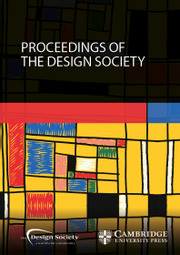Article contents
ENHANCING ENGINEERING CREATIVITY WITH AUTOMATED FORMULATION OF ELEMENTARY SOLUTION PRINCIPLES
Published online by Cambridge University Press: 19 June 2023
Abstract
Several researchers have reported on the effectiveness of knowledge-based inventive stimuli, known in the Theory of Inventive Problem Solving (TRIZ), in enhancing engineering creativity, but few authors have focused on the comparative analysis of structured ideation in engineering design in terms of quantitative and qualitative outcomes. Previous studies have mainly concentrated on the investigation of exemplary selected single stimuli rather than on a critical assessment of the relationship between the structured application of inventive stimuli and their contribution to engineering design. The paper describes a method for the automated formulation of elementary creative stimuli for product or process design at different levels of abstraction and in different engineering domains. The experimental study evaluates the impact of structured automated idea generation on inventive thinking in engineering design and compares it with previous experimental studies in educational and industrial settings. The outlook highlights the benefits of using automated ideation in the context of AI-assisted invention and innovation.
- Type
- Article
- Information
- Creative Commons
- This is an Open Access article, distributed under the terms of the Creative Commons Attribution-NonCommercial-NoDerivatives licence (http://creativecommons.org/licenses/by-nc-nd/4.0/), which permits non-commercial re-use, distribution, and reproduction in any medium, provided the original work is unaltered and is properly cited. The written permission of Cambridge University Press must be obtained for commercial re-use or in order to create a derivative work.
- Copyright
- The Author(s), 2023. Published by Cambridge University Press
References
- 2
- Cited by


